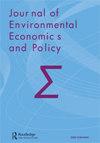Carbon-dioxide emissions management in Sub-Saharan Africa – the irrelevance of natural resource rent as a corrective policy tool
IF 1.2
Q3 ENVIRONMENTAL STUDIES
Journal of Environmental Economics and Policy
Pub Date : 2022-12-31
DOI:10.1080/21606544.2022.2160830
引用次数: 0
Abstract
ABSTRACT This paper revisits the role of natural resource rent in explaining and regulating CO2 emissions in Sub-Saharan Africa (SSA). Three variants of CO2 emissions are considered: territorial CO2 emissions, consumption-based CO2 emissions, and CO2 emission intensity. Panel-corrected standard error and panel autoregressive distributed lag estimation methods were applied. Results show that natural resource rent has a positive effect on consumption-based CO2 emissions, and a negative effect on CO2 emission intensity, but has no effect on territorial CO2 emissions. The results show that while high resource rent in SSA appears to finance consumption of pollution-laden imported goods, it worsens neither territorial CO2 emissions nor CO2 emission intensity. Given that importation of dirty goods is an economic system failure which is not imputable to resource rent, it is safe to conclude that, resource rent does not contribute to rising CO2 emissions in SSA. Key Policy Highlights This paper examined the role of natural resource rent in explaining three variants of CO2 emissions; territorial CO2 emissions, consumption-based CO2 emissions, and CO2 emission intensity. Resource rent has a positive effect on consumption-based CO2 emissions, and a negative effect on CO2 emission intensity, but has no effect on territorial CO2 emissions. While high resource rent in SSA appears to finance consumption of pollution-laden goods, it worsens neither territorial CO2 emissions nor CO2 emission intensity. The relationship between resource rent and the three measures of CO2 emissions suggests that resource rent may not be an important contributor to rising CO2 emissions in SSA.撒哈拉以南非洲的二氧化碳排放管理——自然资源租金作为纠正政策工具的不相关性
本文章由计算机程序翻译,如有差异,请以英文原文为准。
求助全文
约1分钟内获得全文
求助全文
来源期刊

Journal of Environmental Economics and Policy
ENVIRONMENTAL STUDIES-
CiteScore
4.70
自引率
7.70%
发文量
26
 求助内容:
求助内容: 应助结果提醒方式:
应助结果提醒方式:


